August 15, 2024
This July, FreedomFest returned to Las Vegas for its annual conference, the “ultimate summit for liberty.” FreedomFest has been convening since 2007 and Decriminalize Sex Work (DSW) has regularly attended to meet with politicians, voters, authors, academics, and industry leaders to discuss our shared interest in removing criminal penalties for consensual acts between adults.
This year’s Freedomfest featured appearances from presidential candidates, the Free & Equal Presidential Debate, and attendees eager to see candidates who advocate for freedom and liberty on the November ballot. Presidential candidates in attendance this year were Robert F. Kennedy Jr. (Independent), Chase Oliver (Libertarian Party), Dr. Jill Stein (Green Party), Dr. Cornel West (Independent), and Randall Terry (Constitution Party). Out of the five candidates in attendance, only Jill Stein and Chase Oliver have publicly addressed policies related to sex work. According to her official website, “a Jill Stein administration will repeal FOSTA/SESTA which puts sex workers at risk and decriminalize sex work.” Chase Oliver, the Libertarian Party’s candidate for president, has been a prominent supporter of decriminalization and sex worker’s rights for years. In November 2021 he tweeted, “Sex work between consenting adults ought to be 100% legal. Every time we have law enforcement crack down on consenting adults, that’s time away from investigating crimes against children or where there was a lack of consent, actual violence. Victimless ‘crime’ isn’t a crime.”
On the last day of the conference, DSW Political Director Robert Kampia joined Woodhull Freedom Foundation President & CEO Ricci Levy for a panel discussing the decriminalization of consensual adult sex work. Kampia led the Marijuana Policy Project for 23 years, successfully passing medical-marijuana and adult-use legalization laws in 32 states, before joining DSW as political director. During his portion of the panel, he drew on his extensive experience in drug policy to detail the similarities and differences between the political trajectories of marijuana policy and sex work policy. The largest takeaway from Kampia’s remarks was his assertion that when he first began working to legalize marijuana, the pervasive belief was that the work was “impossible” — however, that belief eventually shifted to marijuana legalization being “inevitable.” Kampia posited that sex work policy could see the same shift in the zeitgeist.
Ricci Levy utilized her portion of the panel to discuss America’s relentless obsession with legislating morality. Levy founded Woodhull Freedom Foundation in 2003 in order to affirm sexual freedom as a fundamental human right. Drawing on her decades of experience fighting for bodily and sexual autonomy, Levy addressed the recent age-verification bills introduced around the country and the fight to decriminalize consensual adult sex work, among other topics. The panel was well attended and included an extensive Q&A with the engaged audience. Dr. Barb Brents, a sociology professor at the University of Nevada Las Vegas and advocate for sex worker’s rights, made a guest appearance to answer an attendee's questions on the history of prostitution and prohibition in America.
In August, DSW Legal Director Melissa Sontag Broudo, DSW Staff Attorney Becca Cleary, and DSW Community Engagement Consultant Henri Bynx headed to Louisville, Kentucky for the National Conference of State Legislatures (NCSL), the nation’s largest gathering of state legislators and legislative staff. The summit provides the opportunity for legislators to meet with public policy experts to learn about issues in preparation for the upcoming legislative session. It was a positive and productive summit for DSW staff members who met with multiple legislators and staffers interested in protecting the safety and freedom of sex workers.
While at NCSL, Melissa Sontag Broudo was interviewed by Elizabeth Nolan Brown of Reason for a piece about the legislative summit. In an excerpt from the piece, Nolan asks Broudo “When you talk about this with lawmakers or legislative staff here at the NCSL summit, what has the reaction been so far?” Broudo replied, “I find that people are surprisingly amenable to our perspective. Because when it comes down to it, we’re not [asking] for anything crazy. We’re asking for health and safety of sex workers and survivors of trafficking. So I think there might be a bit of a disconnect at first, especially with our name, but I think once we actually start talking about the bills that we’re introducing and advocating for and what our goals are, it’s actually not this big scary thing that maybe they’ve read about. And so I would say the conversations are overwhelmingly productive and positive.”
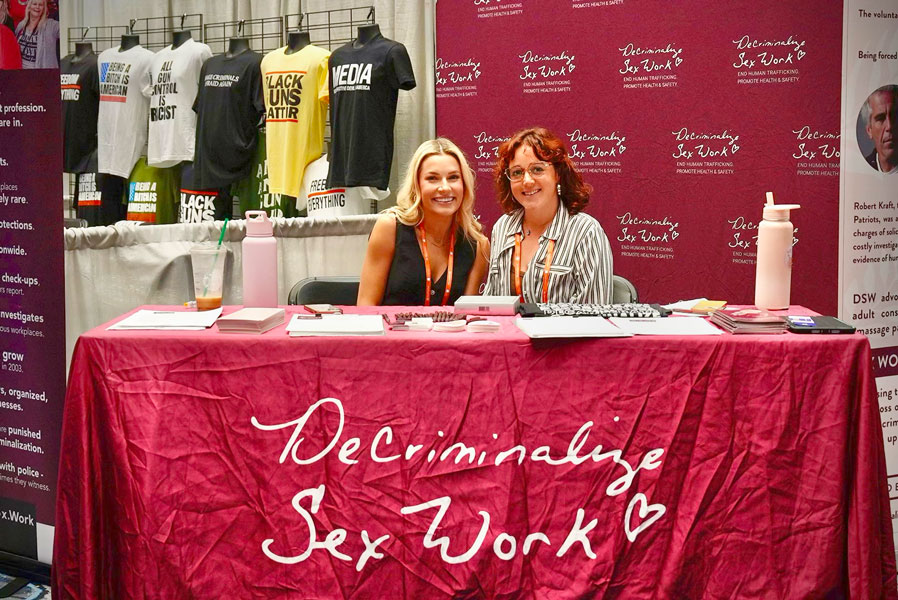
DSW Staff Attorney Becca Cleary and Development Manager Esmé Bengtson at the Decriminalize Sex Work booth at FreedomFest
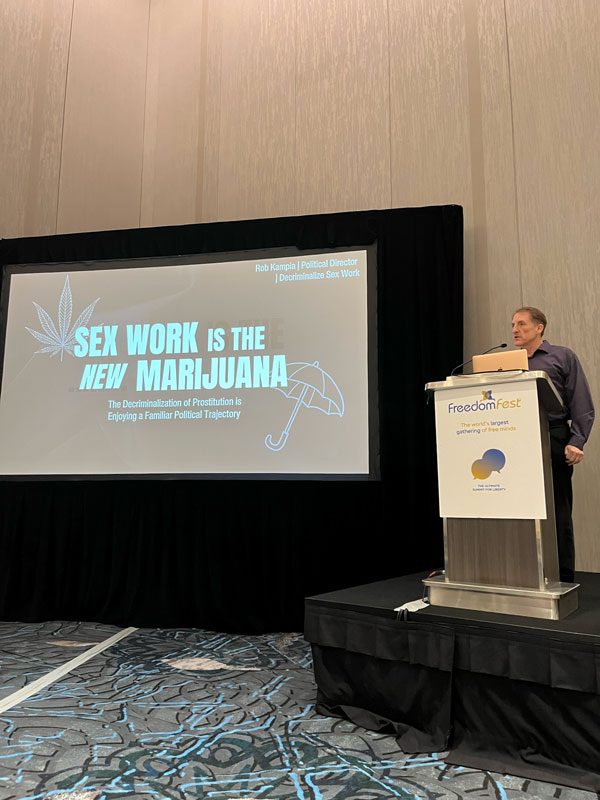
DSW Political Director Rob Kampia speaks on a panel titled Sex Work is the New Marijuana: The Decriminalization of Prostitution is Enjoying a Familiar Political Trajectory
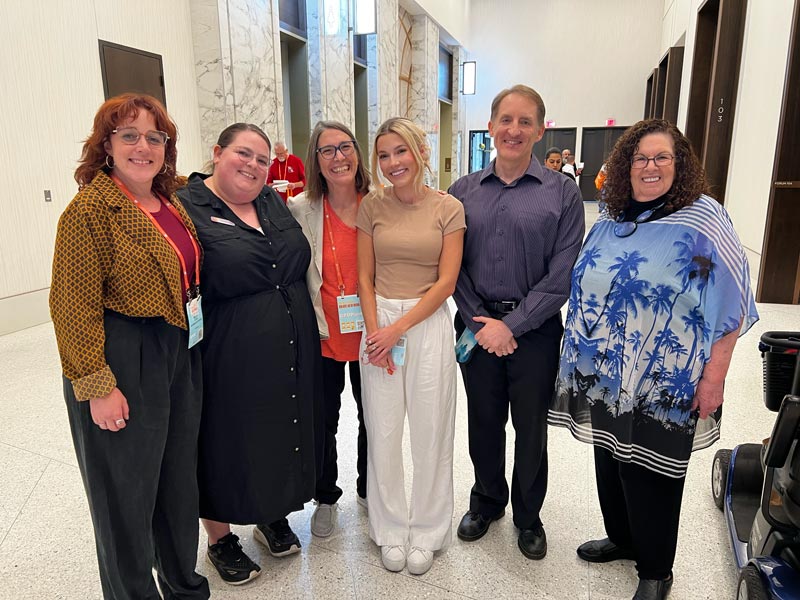
From left to right: DSW Staff Attorney Becca Cleary, Woodhull Freedom Foundation COO Mandy Salley, Dr. Barb Brents, DSW Development Manager Esmé Bengtson, DSW Political Director Rob Kampia, and Woodhull Freedom Foundation CEO Ricci Levy
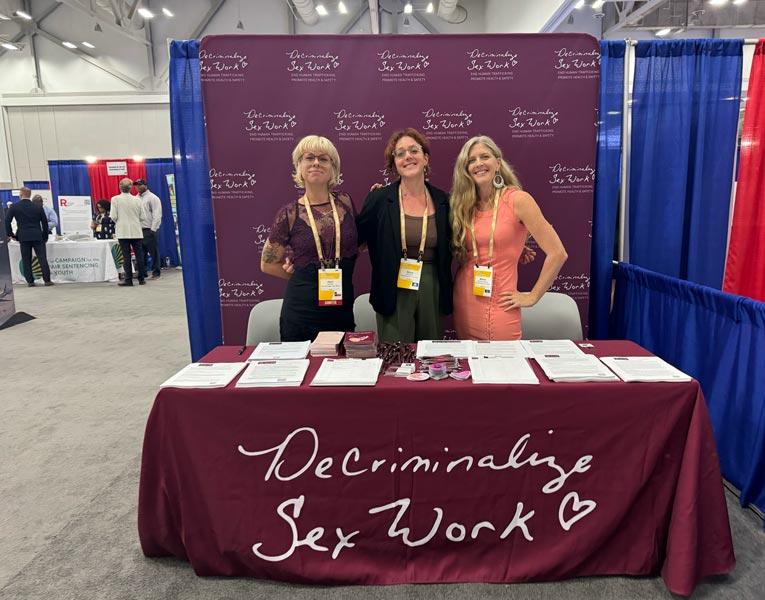
DSW Community Engagement Consultant Henri Bynx, Staff Attorney Becca Cleary, and Legal Director Melissa Sontag Broudo pose in front of DSW’s booth at NCSL
DSW Newsletter #55 (Summer 2024)
DSW Attends FreedomFest in Las Vegas and NCSL in Louisville

VT Advocates in Action
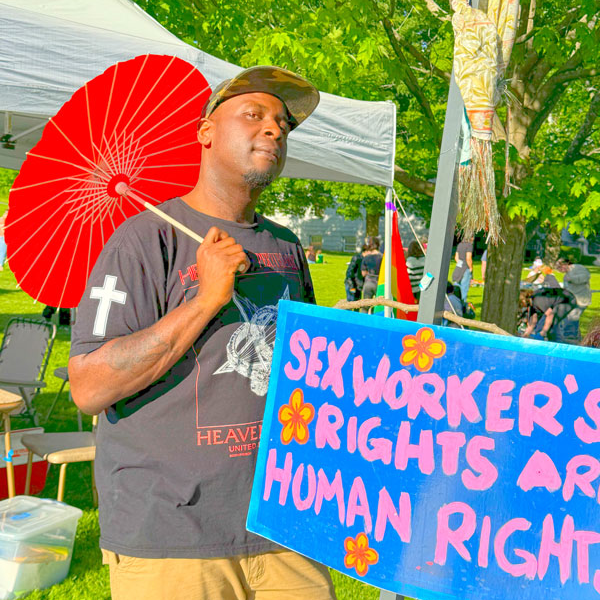
DSW in the News
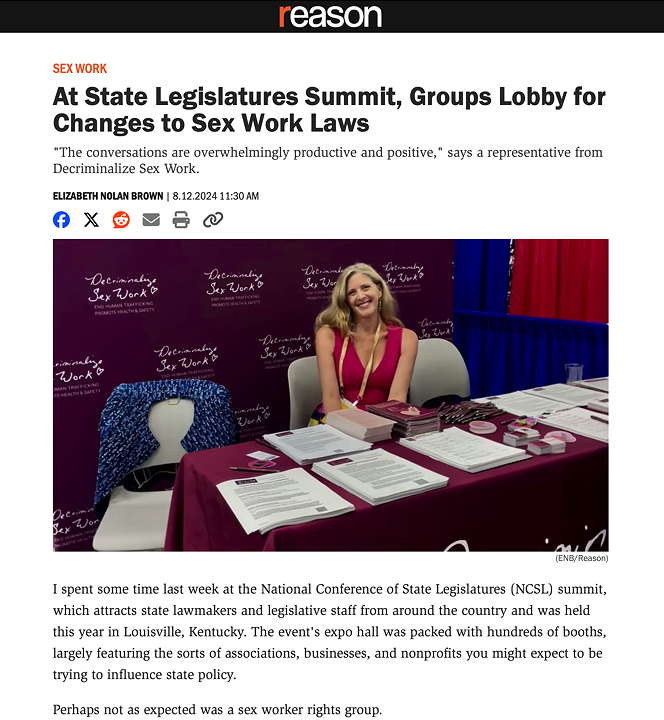
The New York Times Covers Deepfake Pornography

